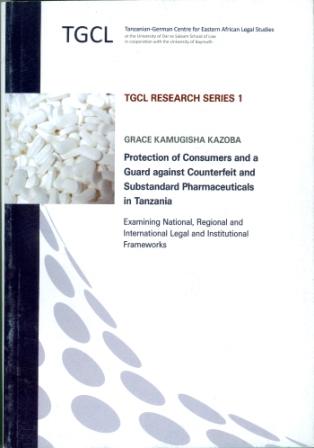
Protection of Consumers and a Guard against Counterfeit and Substandard Pharmazeuticals in Tanzania
Examining National, Regional and International Legal and Institutional Frameworks
Author: Grace Kamugisha Kazoba. Series edited by: Tanzanian-German Centre for Eastern African Legal Studies.
Series: Tanzanian-German Centre for Eastern African Legal Studies, TGCL Research Series Volume 1
201314 pp. Roman, 266 pp.
Appendix: List of Statutes, List of Cases
Text language(s): English
Format: 170 x 240 mm
590 g
Paperback
€ 39.80
Buy 'Protection of Consumers and a Guard against Counterfeit and Substandard Pharmazeuticals in Tanzania' as a downloadable PDF document directly from our online shop »
Order 'Protection of Consumers and a Guard against Counterfeit and Substandard Pharmazeuticals in Tanzania' as print edition »
This book brings together underlying legal theories of intellectual property, consumer protection, international trade and human rights laws to critically look at the role of law in protecting consumers. While the book uses the prevalence of counterfeit and substandard pharmaceuticals in Tanzania as a tool of analysis, it covers areas such as access to affordable quality, efficacious and safe medicines: the right to an effective remedy for those injured through the use of ‘wrong’ medicines; the right to information enabling a consumer to make an informed choice of medicine; and the right of consumers to know how their health is governed.
In this book Grace Kamugisha Kazoba explores the traditional legal theories underpinning consumer protection under common law such as manufacturer liability, product liability, contracts for sale of goods as well as criminal law, and observes that such legal theories are insufficient in protecting consumers against counterfeit and substandard medicines, and hence consumer rights to health and life. It is also noted that theories of intellectual property law at international, regional and national levels as well as those of international trade law, especially at regional revels (including East Africa) and in Tanzania, do not sufficiently promote consumers’ access to quality, efficacious and safe drugs.
Thus the book recommends that the issues elevated should be addressed through a human rights based approach including human rights law. This book is of importance to law students, legal practitioners, policy makers and officials of regulatory institutions as well as anybody interested in consumer protection generally.
Accompanying material:
| « back | Print version | [top] |
 Books
Books Audio
Audio Biographies
Biographies Series
Series Festschrifts
Festschrifts Journals
Journals